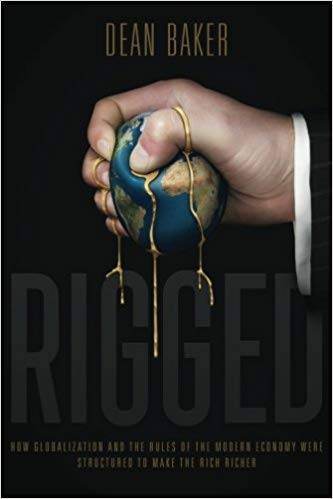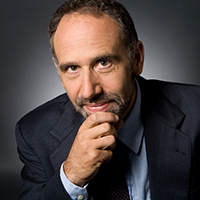ECON 5960-002 The Rigged Economy I featuring Dean Baker
Enrollement Now Open!
(No Prerequisites Required)
Course Description
This course offers students an opportunity to study the pressing issue of inequality under the guidance of the renowned economist Dean Baker, who has been deeply engaged and influential in public policy debates for several decades. The course will be held as a two-semester seminar, and invites all undergraduate and graduate students to participate. The intent is to facilitate ongoing and open deliberation that draws in everybody.
The course will be held as a two-semester seminar, with five three-hour block meetings per semester. Students earn one student credit hour per semester, and would be expected to register for Fall 2019 and Spring 2020. Meetings in Fall 2019 are scheduled for five Thursdays from 3:30pm to 6:30pm. The dates are August 22, September 12, October 3, October 24 and November 14. (Spring meeting times will be published in late Fall 2019.) There are no prerequisites required. Register through your CIS page today!
Course Content
 There has been an enormous increase in inequality over the last four decades. This course will examine the policy factors that have led to this increase. It will first lay out the dimensions of the rise in income inequality, examining
the extent to which the increase is the result of a shift from labor to capital. It
will also compare changes in before-tax and after-tax measures of income inequality,
assessing the extent to which changes in the tax code can explain the rise in inequality.
This discussion will also touch on measures of wealth inequality, which arguably has
increased more than income inequality.
There has been an enormous increase in inequality over the last four decades. This course will examine the policy factors that have led to this increase. It will first lay out the dimensions of the rise in income inequality, examining
the extent to which the increase is the result of a shift from labor to capital. It
will also compare changes in before-tax and after-tax measures of income inequality,
assessing the extent to which changes in the tax code can explain the rise in inequality.
This discussion will also touch on measures of wealth inequality, which arguably has
increased more than income inequality.
Other sessions will explore specific areas where government policy has promoted inequality. The two areas covered this term will be rules on intellectual property and the regulation of finance.
Intellectual property, in the form of patent and copyright protections, has been responsible for many of the largest fortunes created over the last four decades. It has also hugely increased demand for specific skills, notably those associated with the STEM fields. While this has been the point of these policies – to provide incentive for innovation and creative work – we can ask whether alternative policies could have led to comparable gains with less inequality.
The financial sector has also been a source of many of the highest incomes over the last four decades. This is also the result of government policies that have been explicitly designed to promote the growth of the financial sector. This section will discuss whether a smaller financial sector, which creates fewer large fortunes, could be equally effective in serving the needs of the real economy.
One class session will explore the history of institutional and political changes that enabled the transition between the “Golden Age” of capitalism with broadly shared economic gains and the current regime of increasing upward redistribution resulting in large increases in inequality of incomes and wealth.
The final class session of the fall semester will examine the demographics of income and wealth inequality and the role of current and historical policy decisions in shaping the differences associated with age, gender, race, and ethnicity.
Dean Baker
 Dean Baker, visiting professor and instructor, co-founded Center for Economic and
Policy Research (CEPR) in 1999. His analyses have appeared in many major publications,
including The Atlantic Monthly and the Washington Post. He has been regularly featured on such news programs as PBS's NewsHour. Dean has written several books, his latest being Rigged: How Globalization and the
Rules of the Modern Economy Were Structured to Make the Rich Richer and Getting Back
to Full Employment: A Better Bargain for Working People (with Jared Bernstein). His
blog, “Beat the Press,” provides commentary on economic reporting. He received his
B.A. from Swarthmore College and his Ph.D. in Economics from the University of Michigan.
Dean previously worked as a senior economist at the Economic Policy Institute and
an assistant professor at Bucknell University. He has also worked as an analyst for
the Economic Policy Instutite consultant for the World Bank, the Joint Economic Committee
of the U.S. Congress, and the OECD's Trade Union Advisory Council. His areas of research
include housing and macroeconomics, intellectual property, Social Security, Medicare
and European labor markets.
Dean Baker, visiting professor and instructor, co-founded Center for Economic and
Policy Research (CEPR) in 1999. His analyses have appeared in many major publications,
including The Atlantic Monthly and the Washington Post. He has been regularly featured on such news programs as PBS's NewsHour. Dean has written several books, his latest being Rigged: How Globalization and the
Rules of the Modern Economy Were Structured to Make the Rich Richer and Getting Back
to Full Employment: A Better Bargain for Working People (with Jared Bernstein). His
blog, “Beat the Press,” provides commentary on economic reporting. He received his
B.A. from Swarthmore College and his Ph.D. in Economics from the University of Michigan.
Dean previously worked as a senior economist at the Economic Policy Institute and
an assistant professor at Bucknell University. He has also worked as an analyst for
the Economic Policy Instutite consultant for the World Bank, the Joint Economic Committee
of the U.S. Congress, and the OECD's Trade Union Advisory Council. His areas of research
include housing and macroeconomics, intellectual property, Social Security, Medicare
and European labor markets.

